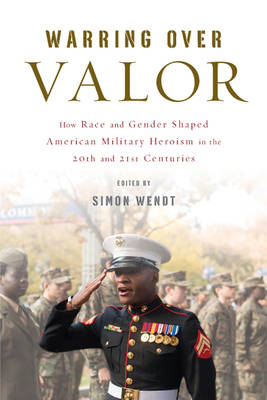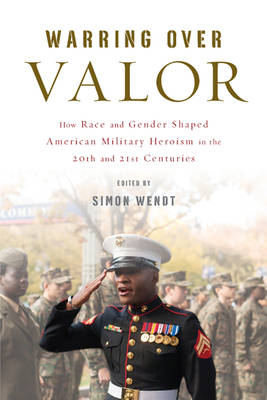
Bedankt voor het vertrouwen het afgelopen jaar! Om jou te bedanken bieden we GRATIS verzending (in België) aan op alles gedurende de hele maand januari.
- Afhalen na 1 uur in een winkel met voorraad
- In januari gratis thuislevering in België
- Ruim aanbod met 7 miljoen producten
Bedankt voor het vertrouwen het afgelopen jaar! Om jou te bedanken bieden we GRATIS verzending (in België) aan op alles gedurende de hele maand januari.
- Afhalen na 1 uur in een winkel met voorraad
- In januari gratis thuislevering in België
- Ruim aanbod met 7 miljoen producten
Zoeken
Warring Over Valor
How Race and Gender Shaped American Military Heroism in the Twentieth and Twenty-First Centuries
€ 76,45
+ 152 punten
Omschrijving
By focusing on how the idea of heroism on the battlefield helped construct, perpetuate, and challenge racial and gender hierarchies in the United States between World War I and the present, Warring over Valor provides fresh perspectives on the history of American military heroism. The book offers two major insights into the history of military heroism. First, it reveals a precarious ambiguity in the efforts of minorities such as African Americans, Asian Americans, Native Americans, women, and gay men to be recognized as heroic soldiers. Paradoxically, America's heroism discourse allowed them to press their case for full membership in the nation, but doing so simultaneously validated the dichotomous interpretations of race and gender they repudiated. The ambiguous role of marginalized groups in war-related hero-making processes also testifies to this volume's second general insight: the durability and tenacity of the masculine warrior hero in U.S. society and culture. Warring over Valor bridges a gap in the historiography of heroism and military affairs.
Specificaties
Betrokkenen
- Uitgeverij:
Inhoud
- Aantal bladzijden:
- 220
- Taal:
- Engels
- Reeks:
Eigenschappen
- Productcode (EAN):
- 9780813597546
- Verschijningsdatum:
- 15/10/2018
- Uitvoering:
- Hardcover
- Formaat:
- Genaaid
- Afmetingen:
- 155 mm x 231 mm
- Gewicht:
- 417 g

Alleen bij Standaard Boekhandel
+ 152 punten op je klantenkaart van Standaard Boekhandel
Beoordelingen
We publiceren alleen reviews die voldoen aan de voorwaarden voor reviews. Bekijk onze voorwaarden voor reviews.








